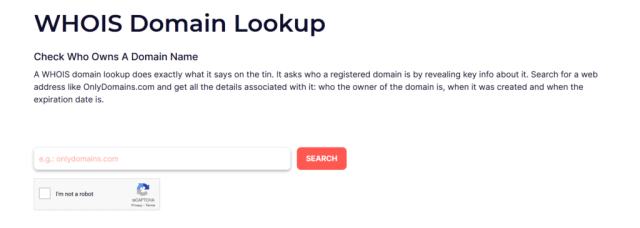Demystifying Domain WHOIS: What It Is and How It Works
Understanding the concept of Domain WHOIS can be deeply beneficial. Not only can it serve as a source of critical information, but it can also protect you from potential online threats and help law enforcement.
Enter the world of Domain WHOIS, your personal domain sleuth. In this article, we’ll escort you through the labyrinth of Domain WHOIS: what it is, how to access it, the kind of information you can uncover, and finally, how to keep your information private.
What Exactly Is a Domain WHOIS?
Well, in a nutshell, a Domain WHOIS is that search tool you reach for when you need information about a specific domain. The WHOIS information gets updated when an individual registers a domain name or alters their DNS settings. That way, the WHOIS database is always up-to-date.
So, this nifty system provides the ability to check registration data for domains, including registration and expiration dates, along with the identities of the domain holders. It’s the digital equivalent of a detective’s magnifying glass, providing you with key insights about a domain and its owner.
Created as a directory, the word WHOIS comes from the phrase “Who is responsible for this domain name?” It’s a question that captures the primary intent of WHOIS data: providing answers about the persons or entities behind a domain. ICANN (Internet Corporation for Assigned Names and Numbers) overseeing the WHOIS database, having taken control of the task in the 1998s, though people having been doing WHOIS searches since the early ‘80s.
How Can I Access the Domain WHOIS?
A Domain lookup or WHOIS lookup tool requests information from the WHOIS directory.

When you enter the site’s domain name and executing a search, a comprehensive report is generated. In the case of onlydomains.com, this is what the WHOIS Search result looks like:
WHOIS Search Result
Domain Name: onlydomains.com
Registry Domain ID: 108742736_DOMAIN_COM-VRSN
Registrar WHOIS Server: whois.instra.net
Registrar URL: http://www.instra.com
Updated Date: 2023-12-05T15:38:46Z
Creation Date: 2003-12-22T19:09:50Z
Registrar Registration Expiration Date: 2024-12-22T19:09:50Z
Registrar: Instra Corporation Pty Ltd.
Registrar IANA ID: 1376
… and so on.
As you can see, you’ll get to see details like registration dates and even server information. It’s a rich resource of data that you can use.
So, I Can Find Out Anything About a Domain and Its Owners?
Well, not exactly everything, but a fair bit. A Domain WHOIS query or WHOIS search can unveil valuable data such as the registration status of the domain, the domain registrar’s contact details, and who registered the domain. This information can be a goldmine for those investigating cyber crimes, competitors keeping an eye on business trends, or anyone planning to purchase an already registered domain name.
Let’s break down the kind of information you may obtain:
- Registration information & status: This can help you ascertain whether a domain is active, expired, or on hold.
- Registrar details: You’ll be able to find out which domain registrar was used to purchase the domain. The registrar’s name can sometimes differ from the actual company that registered the domain if they’re a reseller of the domain registrar.
- Registrant details: Having access to the contact information (such as name, address, and phone number) of the current domain owner can be crucial for your domain name registration. For those of you looking to buy a specific domain name, this feature can be invaluable as you may be able to reach out and negotiate with the current owner!
- Administrative Contact and Technical Contact: Similar to the registrant details but if a domain has different people managing it, these contact details can be used to indicate who those different people are.
- Name Servers and IP Addresses: This information will tell you where the domain name is hosted.
However, please remember that while it can be tempting to snoop around, use this information responsibly. While WHOIS provides access to valuable data, it should never be misused to infringe on someone else’s privacy.
Is There a Way to Keep My Information Private?
Simply put, yes, there is. You can enable privacy protection for your domain name and protect your details through a service known as Domain Privacy Service or WHOIS Privacy. WHOIS Privacy is a service that we (and many other domain name registrars) offer to replace your information with ours, making it impossible for someone to find your personal details in the WHOIS lookup results.
Although WHOIS Privacy keeps your details away from the public eye, it doesn’t make you invisible to legal authorities. It probably goes without saying that by supplying inaccurate information when registering your domain name you run the risk of losing your domain.
However, the availability of WHOIS Domain Privacy depends on the policies of the specific domain extension (like .com or .net) you’ve chosen. Some top-level domains (TLDs) will allow WHOIS privacy, while others won’t. Nothing we as a registrar can do about that.
How WHOIS information differs between Domain extensions
The rules, regulations, and information available in the WHOIS database can indeed vary depending on the domain extension. Let’s take a look at two prime examples: the universal .com and Australia’s .com.au.
.com is a generic top-level domain (gTLD), which means it’s used worldwide without any specific geographic limitations. With such a domain, WHOIS records are usually quite comprehensive. It will most likely include the owner’s name and organisation, contact information, when the domain was registered, and when it will expire.
On the other hand, .com.au is a country code top-level domain (ccTLD) unique to Australia. Due to local regulations governed by the .au registry (auDA), access to WHOIS data for .com.au domains can be more constrained. Although basic information is available (and with basic information we mean registrar details and the domain’s expiry date), personal contact details are often not viewable.
Thus, while WHOIS provides a window into domain details, the kind of information available can differ considerably based on the specific top-level domain in question.
One final important thing to note is that WHOIS privacy services usually aren’t available for country ccTLDs like they are for gTLDs so while WHOIS data can be constrained, it usually is never outright.
What Will the Future of Domain WHOIS Look Like?
Peering into the future of Domain WHOIS is a bit like staring into a crystal ball. Still, it has been around since the early days of the internet and it doesn’t look like it’s going anywhere soon.
As of now, there are no dramatic global standard changes anticipated for the Domain WHOIS. However as the digital world is constantly evolving, tools and databases like the WHOIS system are expected to adapt. This could mean further enhancements in search capabilities or improvements in data privacy measures. But at the end of the day, the future of the domain whois will be shaped by the needs of the internet community.
In summary, Domain WHOIS is a tool that provides a wealth of information, contributing to both online transparency and accountability. It employs a database that stores important details about domain names and their registrants – a treasure trove for those who know how to use the WHOIS service effectively. From identifying cyber threats to keeping track of domain ownership changes, the Domain WHOIS plays a substantial role in the digital landscape.
And who knows, you may even find yourself in this data ocean as a domain owner sooner than you think.

